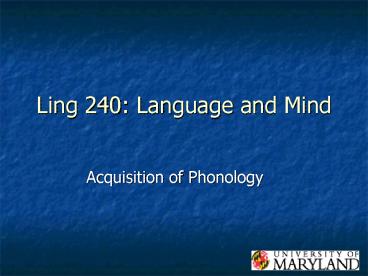Ling 240: Language and Mind - PowerPoint PPT Presentation
1 / 37
Title:
Ling 240: Language and Mind
Description:
Children older than 12 months can move to a new country and acquire native phonology ... development of a linguistic system that imports a subset of the contrasts from ... – PowerPoint PPT presentation
Number of Views:117
Avg rating:3.0/5.0
Title: Ling 240: Language and Mind
1
Ling 240 Language and Mind
- Acquisition of Phonology
2
English
p
b
ph
3
Hindi
p
b
ph
4
English Japanese
l
l
r
r
5
Voice onset time
- VOT the time between the release of a stop and
the voicing of a following vowel
6
Voice Onset Time (VOT)
60 msec
7
Discrimination
D
0ms
20ms
D
D
20ms
40ms
T
40ms
60ms
T
T
8
Categorization of speech sounds
- We group sounds into categories, despite physical
variability - Some physical differences are mentally
represented as not different others as
different - Is categorical perception innate?
- How are mental categories acquired?
9
High Amplitude Sucking Procedure
- Initially sucking rate increases (novelty)
- Then decreases
- Decline in response habituation
LSCP Infant Lab
10
High Amplitude Sucking Procedure
When sucking rate declines to a set point
(habituation criterion), auditory stimulus is
changed
LSCP Infant Lab
11
High Amplitude Sucking Procedure
- If sucking rate increases,
- then we know the infant has detected the change
- The renewed response dishabituation
LSCP Infant Lab
12
Newborns are universal listeners
- Infants perceive speech categorically
- Newborns are sensitive to almost every
phonological distinction yet tested
13
Newborns are universal listeners
- In contrast, adults have difficulty
discriminating speech sounds that are not
contrastive in their native language
14
Hindi contrasts
- dããt tooth
- DããT scold, be angry with
- taal musical note
- Taal to ignore
15
Newborns are universal listeners
- English infants can distinguish Hindi /d/ and /D/
- Japanese infants can distinguish between /l/ and
/r/
16
Studies by Werker et al
- Infants are universal listeners but adults cant
discriminate non-native phonemic contrasts - Then there must be a decline across age
- Questions
- what is the role of experience?
- when exactly does this decline happen?
- is this decline a critical period effect?
17
Testing Across the Lifespan
- young infants
- older infants
- children and adults
Habituation (High Amplitude Sucking)
Conditioned Head Turn Paradigm
Just ask them Same or different?
18
Visual Reinforcer (VR) Toy that lights up and
moves at the experimenters command
Controls for sound stimuli and the VR
19
Conditioned Head Turn
- Child hears Stimulus 1 (/ba/) repeatedly
- Then Stimulus 2 is presented (/da/)
- If child detects difference, he should turn to
look at the visual reinforcer when the stimulus
changes - If child does not detect it, he shouldnt turn
20
Conditioned Head Turn Paradigm
Kuhl Lab, U Washington, 1992
21
Werker 1995
Subjects Hindi adults English
Adults English 6-8 month-olds
Testing /ba/ vs. /da/ /Ta/ vs.
/ta/ /tha/ vs. /dha/
22
Werker 1995
/ba/ vs. /da/ Hindi and English /Ta/ vs.
/ta/ Only Hindi /tha/ vs. /dha/ Only Hindi
23
Results
Werker, 1995
24
Questions
- When does decline in performance take place?
- What exactly is responsible for the decline?
- Does Critical Period play a role?
25
General Methodology question
- We observe that infants behave one way and adults
behave another way. - Goal We want to know what changes at what point
in time. - What are some ways of obtaining this data?
26
Werker Tees 1984
- Test infants of different ages (Cross-sectional)
- Test the same group of infants at different
points in time (Longitudinal) - 6-8 months
- 8-10 months
- 10-12 month
27
Werker Tees 1984 Nthlakampx
- Native American language spoken by about 200
speakers (in 1984) in British Columbiaalso known
as Thompson or Salish - Nthlakampx glottalized velar vs glottalized
uvular ejectives - ki vs qi
- Velar k..
- Uvular q
28
Results
Werker Tees, 1984
29
Werker studies Conclusion
Ability to perceive non-native contrasts declines
in 1st year
Werker and Tees 1984
30
What is responsible for the change? How do
babies become adults?
31
First proposal Maintenance/Loss Hypothesis
- role of experience is to maintain perceptual
sensitivities - lack of exposure leads to loss of perceptual
ability
32
Maintenance/Loss Model
Ability
Experience
No experience
1 year
Time
33
Problems for the Maintenance/Loss Hypothesis
- Prediction?
Decline in sensitivity following lack of exposure
should be permanent and absolute
34
Problems for the Maintenance/Loss Hypothesis
- Predictions are not borne out (1)
- Adults CAN perceive non-native contrasts
- in (perceived) non-speech tasks
- Zulu clicks
- The link to listen to Zulu clicks
- http//www.youtube.com/watch?vgytCi5a7AJg
- sounds in isolation (not syllables)
35
Problems for the Maintenance/Loss Hypothesis
- Predictions are not borne out (2)
- Children older than 12 months can move to a new
country and acquire native phonology
36
Alternative Hypothesis Functional Reorganization
- no absolute hardware changes in auditory system
- development of a linguistic system that imports a
subset of the contrasts from the auditory system
37
Conclusions
- So, what changes during the first year?
- Answer the baby starts to acquire a linguistic
system - As babies acquire a linguistic system (words) in
their first year, they learn which distinctions
need to be represented in that system































